Neil Forsyth on writing the final series of Guilt and adapting the story of The Gold
Neil Forsyth
Writer
Tagged with:
Neil Forsyth is the writer behind Guilt, the multi-award winning Edinburgh-set drama, which returns to ±«Óãtv Scotland and ±«Óãtv Two this week. His adaptation of The Gold, the story of the Brink's Mat robbery also recently hit our screens.
Watch Guilt from Tuesday 25th April on ±«Óãtv Scotland and Thursday 27th April on ±«Óãtv Two
Watch the trailer for Guilt Series 3
When you first thought up the idea for Guilt did you ever imagine you’d be at this point, just about to see the third and final series be broadcast?
I did have a pipe-dream of doing a trilogy but that felt like something that was so distant in those early days when it was just about trying to get the show on the air and keeping it on the air. That’s the big challenge. It’s very hard to get a show on television and it’s even harder to keep it there.
After the second series, when I spoke to the ±«Óãtv, I said that what I’d like to do is one more and I feel very privileged to have been given the opportunity.
How does it feel to have been able to tell a complete story over twelve hours of television?
It’s a fantastic feeling. It’s so rare as a television writer to be the one who actually makes the decision that a show is going to come to an end. To sit down with a third series and think “This is it, how do I want the story to end? Which characters do I want to bring back to tie things up?”. That was extremely satisfying as a writing exercise. It’s the first time I’ve ever had a series where I’ve made that decision as the writer so I found that quite exciting actually, to literally get to the end of a story.

Max (MARK BONNAR);Jake (JAMIE SIVES) in Guilt Series 3 Episode 1 (Credit: ±«Óãtv/Expectation/Happy Tramp North/ Anne Binckebanck)
In the first series the theme of Guilt was everywhere whereas in the second series Revenge was a strong theme. Would you say there is an over-arching theme to this third and final series?
That thematic approach has been Guilt in the first series, Revenge in the second and in the third it is Redemption. This time around it was interesting to watch the characters in their own ways all seek some level of redemption. What that might look like to each of them was also interesting.
Alongside those big over-arching themes what are some of the other ideas that lie behind the story of Guilt?
I think with the brothers, what I tried to do with Guilt is let the characters guide me a little bit through the story and think “what is it about these characters that I still want to know?” It was about digging deeper with all the characters and really getting into their past and their identities to try and understand their outlook and their motivations in the present. Without giving too much away, with the brothers (Max and Jake) I send them back into their past (in a family sense) and it was really interesting to watch them battle with these issues. I think the big thing with me, in terms of knowing that the story has come to an end, is that there’s nothing more about these characters that I need to know. I think that’s a sign for the writer that it’s time to move on.
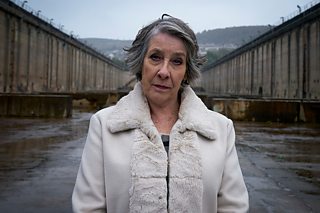
Maggie Lynch (PHYLLIS LOGAN) in Guilt Series 3 (Credit: ±«Óãtv/Expectation/Happy Tramp North/ Anne Binckebanck)
You also recently adapted The Gold for ±«Óãtv One, the story of the Brink's Mat robbery. What is it about the world of crime and criminality that you like exploring?
I think what I find interesting is murky morality. I think writing a black and white moral world isn’t particularly interesting. I don’t think that’s where you end up with a nuanced story or nuanced characters. The greyness in morality is very interesting. Seeing people get sucked into the grey or try to battle out of it gives a show an interesting energy and a great element of surprise. I don’t want to write an overt ‘baddy’ or ‘goody’ as a character, it’s about finding the shades within them. Crime drama lends itself to that.
What I found interesting with The Gold was characters who would have woken up in the morning and the last thing they would have expected was that by the time they went to bed they would have somehow got involved with a large international criminal conspiracy, and yet they did! Those people – what are their stories? How did this happen? Why people commit crimes is far more interesting than the crimes they commit and that’s something that I explored in The Gold (and indeed in Guilt).
Do you think your background in journalism has fed into that curiosity?
It definitely helped with The Gold, which is a vast, vast story. It was about doing the research, being organised and then really looking at the story journalistically in terms of “Where is the television show within this? How can I tell a sprawling and yet relatively concise version of this quite disorganised, multiple story-lined true story. There was certainly a journalistic approach in terms of just finessing the thing and getting it to a manageable size. Then it became far more creative once I got to actually scripting it out.
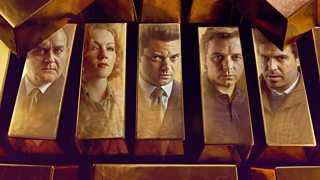
The Gold: Three tonnes of solid gold, six armed robbers and an audacious heist that stunned Britain. Stealing it was just the start. Starring Dominic Cooper and Hugh Bonneville and written by Neil Forsyth.
How did you decide what to keep and what to lose from the screen version of The Gold?
It has to be both interesting and part of something bigger. It needs to be interlinked with bigger narratives. There are lots and lots of fascinating little nuggets in the , even characters and even whole storylines which are not in the television show because they don’t interweave satisfyingly with the bigger narratives. You’ve got to have something that feels like a whole, with lots of moving parts within it which interplay in a satisfying way. There were things that were very regretfully not included. The show’s researcher, Thomas Turner and I were left with this vast research document with lots of story that we hadn’t used in the TV show so we turned that into a book, so none of that work was wasted.
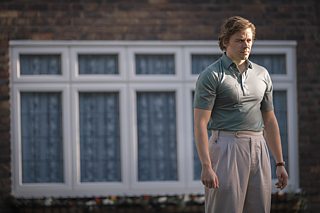
KENNETH NOYE (JACK LOWDEN) in The Gold (Credit: ±«Óãtv/Tannadice Pictures/Sally Mais)
How is the sense of place so important in Guilt?
I lived in for a long time. I feel that I have a connection to Leith and to Edinburgh as a whole. I think it’s a fascinating city. One thing that we explore in Guilt (and it’s a well-trodden path) is the duality of Edinburgh. The old and the new, the dark and the light. That’s something which has been used creatively from onwards and gives the show a validated feel as an Edinburgh-set drama. And then there’s the east coast Scots aspect to it. I’m a Dundonian and I think that the east coast of Scotland has a very particular voice and outlook which is poignant and romantic but there’s a slightly absurdist element to the humour which is something that runs through and certainly through Guilt.
Writing regional television is not about accents but about voice. They are very different things, one of them is much deeper than the other. Hopefully with Guilt we’ve created a show that has a voice, and that’s a voice which has some validation in terms of its setting.
Leith itself is an area in flux but has a history of re-invention and a slight otherness. A lot of people from Leith wouldn’t necessarily see themselves as coming from Edinburgh. One aspect I touch on in the third series is the boundary between Leith and Edinburgh. There was a famous pub called The Boundary Bar that the boundary ran through on Leith Walk and that plays into the plot of the third series, that whole boundary between Leith and Edinburgh.
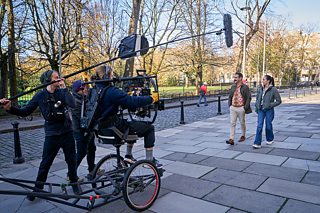
Kenny (EMUN ELLIOTT);Skye (AMELIA ISSAC JONES) filming Guilt Series 3 (Credit: ±«Óãtv/Expectation/Happy Tramp North/ Anne Binckebanck)
Despite that local specificity Guilt has found an audience around the world. Why do you think that is?
It’s gone out in dozens of countries and has been remade in India and optioned in America for a possible US remake. Far more people have watched Guilt around the world than in the UK which is incredible really. I think it’s because it’s both extremely distinctive but has enough depth to it that there are characters and relationships that can be universally recognised. But particularly in the first series the fundamental dramatic building blocks are very accessible. Two very different brothers are thrown into an extreme situation and have to uncomfortably work together to get out of it. That’s not a complicated dramatic premise in terms of its starting point. I think that helps to sell it.
Some of the alternative titles have been ‘The Bloody Brothers’ (India), ‘A Small Murder Between Brothers’ (France), ‘Our Little Secret’ (Sweden), ‘Nobody is Guilty (Germany) – which is probably the one I find most confusing!
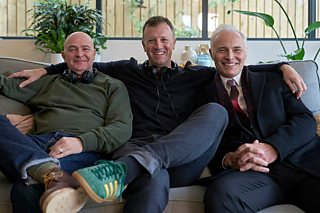
Guilt Series 3 - Director, Patrick Harkins; Writer, Neil Forsyth; Max (MARK BONNAR) (±«Óãtv/Expectation/Happy Tramp North/ Anne Binckebanck)
How difficult is it to get a show like Guilt made?
There was a bit of serendipity involved. I had pitched Guilt in America. I had a spell where I was writing quite a few pilot scripts for the American market, which was exciting – I loved going over there and going around the studios. It was financially welcome but creatively quite dispiriting because none of them got made. These American networks tend to hoover up a huge amount of ideas and order the scripts but they don’t end up in production and it’s very, very difficult to get those scripts back from America. I had pitched the idea of Guilt in America and very nearly got a script order from a big studio. Thankfully I didn’t because that would have been Guilt gone. I would never have got it back.
Having failed to sell it there, when I came back I thought that where I really wanted to set this show was in Leith. That is the place that I know. So I wrote the scripts and pitched it to ±«Óãtv Scotland who were in the process of launching a new channel. had originally commissioned Bob Servant from me years before, so I quite tentatively sent him the script as I hadn’t written episodic drama before and he came back to me over the weekend. I was fortunate that ±«Óãtv Scotland were looking for a drama to help launch the new channel and for something very Scottish. That was in 2019 and now we’re here four years later with the final series going out.
Has Guilt changed your writing career?
I’m not sure many other networks would have given me the opportunity to make a drama series at that point. Guilt has been absolutely integral to my career and made such a difference that I think I was then taken much more seriously when I pitched something like The Gold. Again though, with The Gold, I had first written the pilot script. That’s something that I increasingly do with a new development – I write the opening script. I think it’s really helpful for me to be able to work out the show in my own little world and to be able to present that. I think that writing treatments can just lead to endless conversations before you’ve even written a word of script, which can muddy the mind of the writer a little bit.
The script of The Gold bounced about for years through various incarnations and people before the timing was right with the ±«Óãtv.
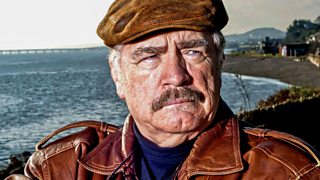
Brian Cox as Bob Servant in Neil Forsyth's ±«Óãtv adaptation of stories based on his Bob Servant books. Bob Servant was first adapted for Radio Scotland as The Bob Servant Emails.
Do you always write the whole pilot script for a show before approaching broadcasters with the idea?
In an ideal world I’ll go to broadcasters with a pilot script and a series outline because I think it’s far more interesting to read a script than a treatment document. I also feel that I’ve then been allowed to create the show that I want to create. Of course if you go into production then it becomes a collegiate and collaborative process but at least those fundamental building blocks of the pilot script and the overall outline are something that I have written with a clear head and no other voices around me. If they don’t want to make it then at least you feel that you have presented the best version of that show and the version that you believe in the most.
I also feel with treatments that they are such embryonic visions of a television show that it can be quite dangerous for a writer. If you take a fundamental note on that treatment that you don’t wholly agree with – you might think “well it’s only changing this character’s outlook or changing this relationship” but when you extrapolate that out over a six episode series it’s a seismic change to the original vision you had and when you get to episode four you may think “why did I say yes to that because now I’ve got this character I don’t understand” or “I’ve lost what I really liked about this character”.
Having experienced the system in the US do you find it easy to keep generating new ideas?
It helps working off a lot of true stories where it’s a lot of creative writing but the essence of the story is existing. Or with Guilt I’ve spent so long with those characters that they do genuinely help me find story because I understand how those characters are going to react to situations. If you have strong characters then you get strong story. So if you have a really deep and nuanced understanding of a character then you can work out how they might react to situations and drive you on to the next consequence of their actions.
If you are pitching lots of ideas and writing lots of pilot scripts I think there’s a danger that you start to get a little bit ‘hacky’ and start looking at other shows that have sold and slightly tweaking their premise. I definitely reached a period of my career five or six years ago now where I hit a wall and spent too long in that system pitching ideas that were half-baked or superficial and ended up writing scripts that were half-baked and superficial as a result. I had a period where I just took a month off writing and reset and thought back to my days as a journalist, my interest in true stories and writing something that meant something to me. That month I wrote a one-page document that became Guilt. I read Eddie Braben’s book which became ‘Eric, Ernie and Me’ and I wrote a couple of little pitches that became a couple of the that I wrote for Sky Arts. So it was incredibly fruitful.
One of the things I did that month was I wrote (and I keep this on a board in my office) Do You Want To Write This? It’s quite important as a writer that you are writing something for the right reasons. Is this something that you are creatively excited about or are you just writing something because it might sell because it’s a bit like that other show on TV?
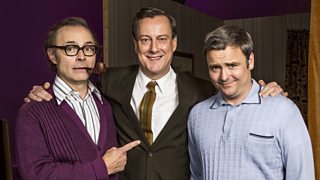
Eric, Ernie and Me - the story of Eddie Braben, Eric Morecambe and Ernie Wise. Adapted for TV by Neil Forsyth from Eddie Braben's memoirs.
How would you describe your writer’s voice? How does comedy play into it?
I think I write stories that are dramatically driven – I never come up with a story point just to create a funny situation – comedy should play no part in the outlining. Character, drama and story drive the outline. But when I’m writing a script then humour is always available as a way that a character might react to pressure or conflict. I think six part dramas where no one says anything funny actually feel unrealistic and superficial because that doesn’t really reflect real life.
Any advice you can share?
While it’s always interesting to explore societal issues and touch on bigger themes, you can’t let that outweigh the storytelling. I try to write things that are hopefully nuanced but are also unashamedly entertaining. I do think about people coming home from work exhausted and turning on the TV. When I’m writing a script I always think “Why are they still watching this after ten pages?”, “Why are they still watching after ten minutes?” Also I want to find it exciting if I’m going to have to read a script a hundred times!
My biggest tip for a new writer would be to write something that you believe in, that you’re excited about. Make sure that is your motivation because it might not get made and if it doesn’t get made then you want to have a script that you are really proud of and that you feel made you a better writer while you were writing it. Don’t write a script because you think it’s the kind of show that you think might get made or you’ve read somewhere that people are looking for this kind of thing. Sit and write the show that you want to write because that’s the only way that you’re going to become a better writer.
My practical advice would be – I always know what I’m going to write tomorrow. The last thing I do at night is write myself a little note saying “tomorrow, starting page 10" or "scene 11” and it’s always the biggest problem I’ve got. I always try and write the hardest scene I have to write first thing and it’s amazing how often it’s not challenging at all when you’ve got some reserves of energy. When I’m tired and I’ve still got to do some more I tend to read the scenes that are working, the ones that are nearly there as that gives you a bit of confidence ahead of tomorrow.
The other thing is the importance of stopping. It’s counter-productive to put yourself through huge marathon writing sessions when you don’t need to. Get away from the desk and live your life. It’s when you’re out doing something else that you’re more likely to come up with the little narrative fix that you’ve been looking for rather than staring at a wall for five hours. It’s out there in the world that you’re going to get your ideas and have the experiences – good and bad – that will feed into your work.
Watch all three series of Guilt on ±«Óãtv iPlayer
